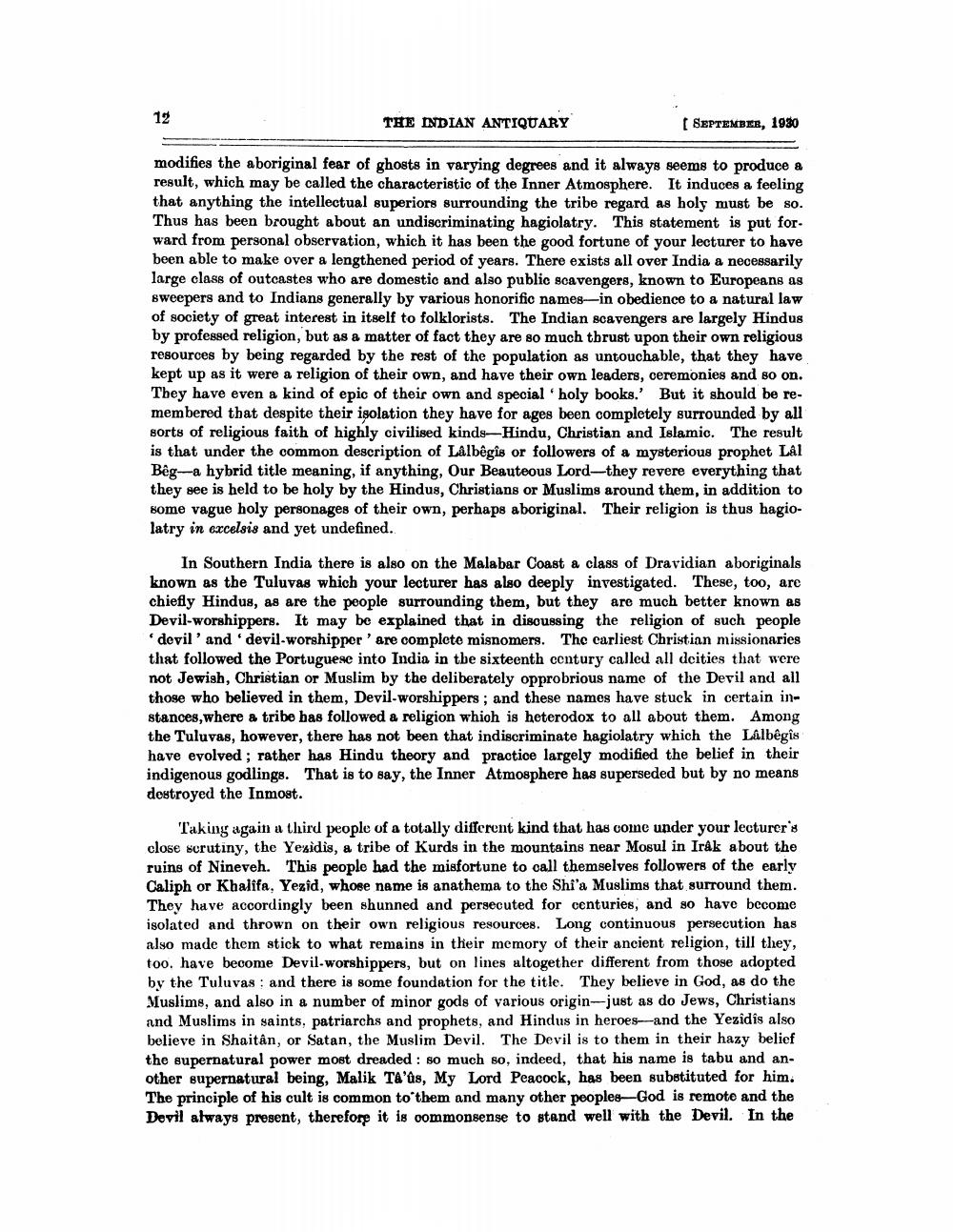________________
THE INDIAN ANTIQUARY
SEPTEMBER, 1930
modifies the aboriginal fear of ghosts in varying degrees and it always seems to produce a result, which may be called the characteristic of the Inner Atmosphere. It induces a feeling that anything the intellectual superiors surrounding the tribe regard as holy must be so. Thus has been brought about an undiscriminating hagiolatry. This statement is put for. ward from personal observation, which it has been the good fortune of your lecturer to have been able to make over a lengthened period of years. There exists all over India a necessarily large class of outcastes who are domestic and also public scavengers, known to Europeans as sweepers and to Indians generally by various honorific names-in obedience to a natural law of society of great interest in itself to folklorists. The Indian scavengers are largely Hindus by professed religion, but as a matter of fact they are so much thrust upon their own religious resources by being regarded by the rest of the population as untouchable, that they have kept up as it were a religion of their own, and have their own leaders, ceremonies and so on. They have even a kind of epic of their own and special holy books.' But it should be remembered that despite their isolation they have for ages been completely surrounded by all sorts of religious faith of highly civilised kinds-Hindu, Christian and Islamic. The result is that under the common description of Lalbêgês or followers of a mysterious prophet Lal Bêg--a hybrid title meaning, if anything, Our Beauteous Lord-they revere everything that they see is held to be holy by the Hindus, Christians or Muslims around them, in addition to some vague holy personages of their own, perhaps aboriginal. Their religion is thus hagiolatry in excelsis and yet undefined.
In Southern India there is also on the Malabar Coast a class of Dravidian aboriginals known as the Tuluvas which your lecturer has also deeply investigated. These, too, are chiefly Hindus, as are the people surrounding them, but they are much better known as Devil-worshippers. It may be explained that in discussing the religion of such people
devil' and 'devil worshipper' are complete misnomers. The carliest Christian missionaries that followed the Portuguese into India in the sixteenth century called all deities that were not Jewish, Christian or Muslim by the deliberately opprobrious name of the Devil and all those who believed in them, Devil-worshippers ; and these names have stuck in certain instances, where & tribe bas followed a religion which is heterodox to all about them. Among the Tuluvas, however, there has not been that indiscriminate hagiolatry which the Lalbêgis have evolved ; rather has Hindu theory and practice largely modified the belief in their indigenous godlings. That is to say, the Inner Atmosphere has superseded but by no means destroyed the Inmost.
Taking again a third people of a totally different kind that has come under your lecturer's close scrutiny, the Yexidis, a tribe of Kurds in the mountains near Mosul in Iråk about the ruins of Nineveh. This people had the misfortune to call themselves followers of the early Caliph or Khalifa, Yezid, whose name is anathema to the Shi'a Muslims that surround them. They have accordingly been shunned and persecuted for centuries, and so have become isolated and thrown on their own religious resources. Long continuous persecution has also made them stick to what remains in their memory of their ancient religion, till they, too. have become Devil-worshippers, but on lines altogether different from those adopted by the Tuluvas: and there is some foundation for the title. They believe in God, as do the Muslims, and also in a number of minor gods of various origin-- just as do Jews, Christians and Muslims in saints, patriarchs and prophets, and Hindus in heroes--and the Yezidis also believe in Shaitan, or Satan, the Muslim Devil. The Devil is to them in their hazy belief the supernatural power most dreaded : so much so, indeed, that his name is tabu and another supernatural being, Malik Ta'as, My Lord Peacock, has been substituted for him. The principle of his cult is common to them and many other peoples-God is remote and the Devil always present, therefore it is oommonsense to stand well with the Devil. In the




